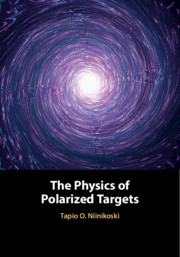Book contents
- The Physics of Polarized Targets
- The Physics of Polarized Targets
- Copyright page
- Dedication
- Contents
- Preface
- Acknowledgements
- 1 Introduction to Spin, Magnetic Resonance and Polarization
- 2 Resonance and Relaxation of Interacting Spin Systems
- 3 Electron Paramagnetic Resonance and Relaxation
- 4 Dynamic Nuclear Polarization
- 5 Nuclear Magnetic Resonance and Relaxation
- 6 NMR Polarization Measurement
- 7 Polarized Target Materials
- 8 Refrigeration
- 9 Microwave and Magnet Techniques
- 10 Other Methods of Nuclear Spin Polarization
- 11 Design and Optimization of Polarized Target Experiments
- Appendices
- Index
- References
7 - Polarized Target Materials
Published online by Cambridge University Press: 03 February 2020
- The Physics of Polarized Targets
- The Physics of Polarized Targets
- Copyright page
- Dedication
- Contents
- Preface
- Acknowledgements
- 1 Introduction to Spin, Magnetic Resonance and Polarization
- 2 Resonance and Relaxation of Interacting Spin Systems
- 3 Electron Paramagnetic Resonance and Relaxation
- 4 Dynamic Nuclear Polarization
- 5 Nuclear Magnetic Resonance and Relaxation
- 6 NMR Polarization Measurement
- 7 Polarized Target Materials
- 8 Refrigeration
- 9 Microwave and Magnet Techniques
- 10 Other Methods of Nuclear Spin Polarization
- 11 Design and Optimization of Polarized Target Experiments
- Appendices
- Index
- References
Summary
We discuss here the choice of solid compounds and materials which best suit various types of applications, focusing mainly on the polarized targets. These materials include hydrogen-rich glassy hydrocarbons and simple cubic crystalline ammonia and lithium hydrides. The glassy hydrocarbons can doped by dissolved stable free radicals, while crystalline materials are doped by radiolytic paramagnetic radicals. The leading application of DNP up till now has been the scattering experiments in high-energy and nuclear physics. Other applications include measurements of slow neutron cross-sections, molecular physics using slow neutrons, nuclear magnetism and other solid-state physics experiments, and spin filters. The use of polarized solids in fusion and in magnetic resonance imaging has also been discussed. The material choice evidently depends strongly not only on the application but also on the goal of the experiment or process which is considered. More recently DNP has been used for the signal enhancement in NMR studies of complex chemical and biochemical molecules. In this context DNP and other enhancement techniques are called by the term “hyperpolarization”.
Keywords
- Type
- Chapter
- Information
- The Physics of Polarized Targets , pp. 283 - 338Publisher: Cambridge University PressPrint publication year: 2020

